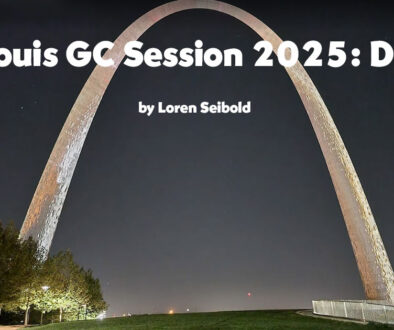Loren Seibold Doesn’t Appear to Understand Conservatives
May 5, 2019 |
Dear Editor:
Loren Seibold’s article of April 11, “Why Adventists Can’t Talk About Politics,” shows, I think, exactly why Adventist leaders and publications should probably stay away from public political discussions. He writes, as many on the left do, as if there is no other “right” way to think than his way—about Donald Trump, health care, the military, “social justice,” and other hot-button topics—if one is a decent, caring Christian or Seventh-day Adventist.
But so many of Seibold’s assertions have reasoned, valid rebuttals possible that one would hardly know where to begin. As just one example, when he suggests that Trump voters don’t care about “our neighbors working for poverty wages,” it might be pointed out that, by all measures, conservatives give significantly more out of pocket than liberals to charitable causes—whether in terms of dollar amounts, percentage of income, or volunteer time. Some might say liberals tend to “care” via the tax system, which is difficult to see as caring at all, since it is coerced. Some of us think this is hardly what the Bible had in mind. (See New York Times’ columnist Arthur C. Brooks’ book, Who Really Cares: The Surprising Truth About Compassionate Conservatism—Who Gives, Who Doesn’t, and Why It Matters. Brooks set out to show liberals care more, and what he found shocked him.)
Further, according to a New York Times May 3rd article, we now have “the lowest unemployment rate in a half century. More than 260,000 new jobs. And higher hourly wages.” The Washington Post informs us “there have been almost 4.9 million jobs created since January 2017, according to the Bureau of Labor Statistics, of which 436,000 are manufacturing jobs.” Does Trump frequently exaggerate his numbers? Yes, he exaggerates almost everything. But one can hardly dispute that our economy is doing well. Very well. So well that the Democrats are worried about the next election because of it. Not, mind you, because they might lose wealthy voters, but because they might lose poorer voters who see that they are doing better.
It would be interesting to know by what metric Mr. Seibold assesses that the poor have ever been better off under a Democratic administration than the current one he so deplores. And is he okay with the fact that businesses which depend on minimum wage workers are going out of business due to Democrat-instigated laws that mandate wages above market value? Those are real jobs being lost, jobs many of the poorest workers rely upon.
Mr. Seibold’s concerns appear to center upon a demographic group which earns less than a theoretical, arbitrary poverty line that places America’s poor in the top 5% of the world as far as economic well-being is concerned.
And let’s think a little less parochially for a moment. Ninety-nine percent of the world’s population makes below $32,400 in annual income. This means that, if Mr. Seibold clocks in anywhere above that, he’s in the one percent. Would he and his ideological fellows be willing to part with every bit of their income above $32,400 to achieve true global economic equality?
The real problem with most poverty in the world is not unequal distribution of money but corrupt governments with less-than-optimal founding documents and principles that, even when decent-sounding, are largely ignored anyway. Even in America, the problems are seldom monetary so much as values-based. But values are harder to change than economic policy.
It has been said that a lie can travel halfway around the world while truth is getting its shoes on. It would take a politically astute, conservative-leaning writer of some talent a lot of ink to even begin to do all that is possible to take Mr. Seibold’s piece apart, and show him, in the process, what he seems oblivious to—how a really good Christian could have legitimately voted for Donald Trump, and can continue to support him—now more than ever.
I’ll try to do the latter in one sentence: the alternative candidate was a person who would have undoubtedly taken this country further down a left-heading path, and many Christians, including me, view leftism (as opposed to classical liberalism) as a mortal threat to this country.
What country? The U. S. A., as we have known it, and as some of us believe our founders intended it: with the values inscribed on its coins as its three overarching values. This country has historically championed, with admittedly large, shameful lacunas in its practice, these three values above all others—Liberty, In God We Trust, and E Pluribus Unum (Out of Many, One). It is a unique trinity among the nations of the world.
Note that “equality,” the highest value of the left, is not among the values on our coins. Not because it isn’t a worthy goal, by some definitions and in some iterations, but because it wasn’t part of the essential basis of this country’s founding as it was in other countries, such as France. France has, as its declared trinity, Liberty, Equality, and Fraternity. Personally, I’d rather live here than there, with our trinity rather than theirs. Conservatives see left-leaning politicians and activists as preferring theirs to ours, and worry where that will lead.
Perhaps our founders realized how “equality” as a prime value could—and almost certainly would, given enough time—be used to enlarge government to such a dangerous level of power and coercion that it would cause great evil. I wonder if Mr. Seibold would agree that the very bedrock principle on which this country was founded was the principle of limited government. I wonder if he would further agree that government must become quite large and coercive to achieve the goal of equality.
Put simply, where the two conflict, which they often must, right-leaners tend to value liberty over equality, while left-leaners tend to value equality over liberty. The former hierarchy very much repulses left-leaners, while the latter very much concerns right-leaners. Nobody needs to get any more denigrating than that, to show how we differ.
To sum up, we politically conservative Adventists had to swallow hard, and vote for a person who was personally repugnant to many if not most of us, but who was our only hope, as we saw it, to move our vehicle off the cliff. If one is in a car one believes is about to go over the edge into an abyss, and a driver steps in who credibly says he can bring it back onto the road, one doesn’t pay too much attention to his vulgar speech, his bad hairdo, or even his history with women. The passenger in that car, if he truly believes it is on the brink of disaster and this man is his only hope, similarly wouldn’t be wise to just “sit out the vote,” saying one doesn’t wish to be associated with such an unseemly driver, and will merely vacate the car when the crash is over. The choice at that point seemed just that stark, and we made it on that basis.
So, the real argument between Mr. Seibold and people like me is over left-leaning values versus right-leaning ones, not the moral state of Donald Trump.
And that’s a whole other discussion, or many discussions, ones that ought to be carried out without editorial prejudice toward one side or the other, if it is to be carried out at all in a journal like Adventist Today.
Why is this all so hard to understand? Why is it that right-wingers so often seem to know and understand left-wingers’ reasoning, and can even see that it’s often coming from a good place; but the reverse so seldom seems to be true?
I’d like to suggest Adventist Today think over that question, and if it doesn’t have any better answer than columns such as this one by Loren Seibold, avoid—yes, avoid—the topic of contemporary politics altogether. Plunging in in the way Seibold did, with suggestions of crass disregard for morality and utter lack of human compassion in one’s political opponents, is not only terribly divisive and potentially unjust, it could easily lose you half your potential readers.
Janine Colburn
Editor, The C. S. Lewis Index
Loma Linda, CA




